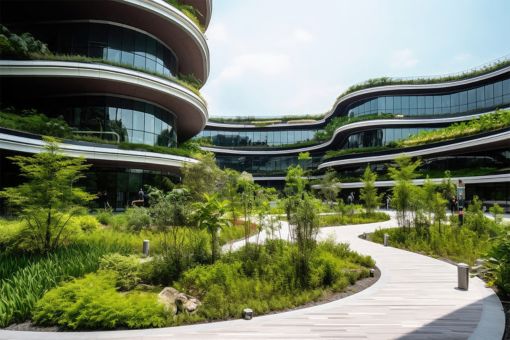Manufacturing companies face a range of both challenges and opportunities in aligning their operations with sustainability requirements. The move towards a more sustainable future comes not only from stringent regulatory demands, it is also a strategic imperative that can dictate a company's success and resilience in the market. In this article, KPMG shares insights on a selection of key choices and considerations to effectively embed sustainability in the organization.
The need for change
The manufacturing sector operates within a turbulent environment characterized by new regulations, shifting market demands and an increased need for environmental stewardship. While navigating these complexities and compliance requirements, businesses have to rely on innovation and an increased focus on sustainability to drive profitable growth.
"The success of companies’ business models will not only be determined by reporting on traditional KPIs. It will also be determined by the ability to transform their business to address broader commercial and operational requirements in line to sustainability goals", says Stefano Bontesse de Filippis, Director at KPMG.
New regulatory frameworks are emerging, setting ambitious targets for greenhouse gas (GHG) reduction. This prompts companies to reassess their operations, supply chains and product lifecycles. For example, stricter emissions standards for vehicles and components requires an urgent sustainable transformation that aligns with global climate goals.
The role of the Chief Sustainability Officer is also expected to evolve, as responsibilities shift to the business line. This requires a clear vision for the future, including determining target maturity levels and additional capability requirements for impacted areas.
We believe that CSO’s role will evolve from a legacy focus on compliance toward one of value preservation and creation. Some companies in the Manufacturing and Private Equity sectors are already going this way and this trend is boosted by the increased availability of net zero solutions, alternative materials (for use in promoting circularity) and the need for greater transparency across supply and value chains.
Strategic transformation and governance
A comprehensive transformation of business operating models and governance structures is increasingly essential to meet sustainability objectives. This includes integrating a sustainability component across all organizational functions along the value chain, from Procurement, Research & Development and Product Development through to Manufacturing and beyond.
While a central Sustainability team should be responsible for prioritizing the most critical strategic sustainability initiatives, it is imperative that these are co-developed and implemented by impacted business functions. Organizing transformation focused teams from applicable functional areas around prioritized sustainability-led workstreams, will support a more efficient and effective transformation journey.
Companies should consider further developing (central) Sustainability teams, who can be deployed into business units as dedicated task forces. These teams would collaborate in the design and delivery of initiatives geared toward reducing emissions, while also enhancing local capabilities and promoting knowledge-exchange across business areas.
“Central to such a transformation is the establishment of a robust governance model that secures clear accountability, facilitates cross-team collaboration, helps build know-how and drives change throughout the organization,” Stefano adds.
The foundation for operational excellence and market leadership
The path to sustainability has many challenges, such as supply chain complexities and technological integration, but it also offers considerable opportunities. Companies can enhance their brand reputation, unlock innovation and secure long-term profitability and competitiveness by embedding sustainability into their core strategy. The journey towards sustainability is a strategic imperative to meet the capital market demands, not just a moral obligation.
Combining initiatives designed to realize sustainability objectives with those designed to improve supply chain and operational efficiency, can help enhance overall commercial excellence. Support may be required from new or upgraded system solutions, such as data collection and consolidation across multiple product types, business areas and geographies. Robust levels of data quality and granularity will be increasingly crucial for future measurement and reporting. A range of technology solutions, typically covering multiple functional requirements, have been developed by external vendors, requiring careful consideration to ensure a cost-effective design and implementation.
“The integration of sustainability across the value chain will be a critical determinant of success for firms in the manufacturing sector. Taking a more targeted and holistic approach to sustainability governance and strategy setting, with a predominant focus on enhancing their commercial and operational excellence (ahead of simply meeting regulatory compliance requirements) will enable firms to more effectively navigate the challenges of an increasingly complex market landscape and further augment their position while preserving their profits.” Stefano concludes.

Stefano Bontesse de Filippis
Director, Climate & Sustainability Consulting
Email
+46 70 573 9016
Discover more
Our team at KPMG have also recently published the following points of view on related topic areas.



